6 books about Derbyshire, Katy
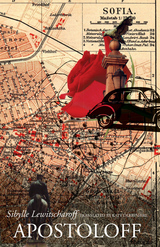
Apostoloff
Sibylle Lewitscharoff
Seagull Books, 2019
“Gone, finito, The End, I say. A father who puts an end to it all before he wears down the whole family deserves more praise than damnation.”
Two sisters travel to Sofia—in a convoy of luxury limousines arranged by a fellow Bulgarian exile—to bury their less-than-beloved father. Like tourists, they are chauffeured by the ever-charming Ruben Apostoloff—one sister in the back seat, one in the passenger seat, one sharp-tongued and aggressive, the other polite and considerate. In a caustic voice, Apostoloff shows them the treasures of his beloved country: the peacock-eye pottery (which contains poisonous dye), the Black Sea coast (which is utterly destroyed), the architecture (a twentieth-century crime). His attempts to win them over seem doomed to fail, as the sisters’ Bulgarian heritage is a heavy burden—their father, a successful doctor and melancholy immigrant, appears in their dreams still dragging the rope with which he hanged himself.
An account of a daughter’s bitterly funny reckoning with her father and his country, laden with linguistic wit and black humor, Apostoloff will introduce the unique voice of Sibylle Lewitscharoff to a new and eager audience.
[more]
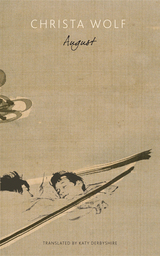
August
Christa Wolf
Seagull Books, 2019
Christa Wolf was arguably the best-known and most influential writer in the former East Germany. Having grown up during the Nazi regime, she and her family were forced to flee their home like many others, nearly starving to death in the process. Her earliest novels were controversial because they contained veiled criticisms of the Communist regime which landed her on government watch lists. Her past continued to permeate her work and her life, as she said, “You can only fight sorrow when you look it in the eye.”
August is Christa Wolf’s last piece of fiction, written in a single sitting as an anniversary gift to her husband. In it, she revisits her stay at a tuberculosis hospital in the winter of 1946, a real life event that was the inspiration for the closing scenes of her 1976 novel Patterns of Childhood. This time, however, her fictional perspective is very different. The story unfolds through the eyes of August, a young patient who has lost both his parents to the war. He adores an older girl, Lilo, a rebellious teenager who controls the wards. Sixty years later, August reflects on his life and the things that she taught him.
Written in taut, affectionate prose, August offers a new entry into Christa Wolf’s work and, incidentally, her first and only male protagonist. More than a literary artifact, this new novel is a perfectly constructed story of a quiet life well lived. For both August and Christa Wolf, the past never dies.
August is Christa Wolf’s last piece of fiction, written in a single sitting as an anniversary gift to her husband. In it, she revisits her stay at a tuberculosis hospital in the winter of 1946, a real life event that was the inspiration for the closing scenes of her 1976 novel Patterns of Childhood. This time, however, her fictional perspective is very different. The story unfolds through the eyes of August, a young patient who has lost both his parents to the war. He adores an older girl, Lilo, a rebellious teenager who controls the wards. Sixty years later, August reflects on his life and the things that she taught him.
Written in taut, affectionate prose, August offers a new entry into Christa Wolf’s work and, incidentally, her first and only male protagonist. More than a literary artifact, this new novel is a perfectly constructed story of a quiet life well lived. For both August and Christa Wolf, the past never dies.
[more]
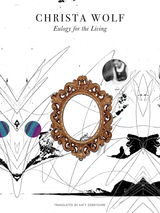
Eulogy for the Living
Taking Flight
Christa Wolf
Seagull Books, 2018
A fragmentary work that stands as a testament to Wolf's skill as a thinker, storyteller, and memorializer of humanity’s greatest struggles.
Christa Wolf tried for years to find a way to write about her childhood in Nazi Germany. In her 1976 book Patterns of Childhood, she explained why it was so difficult: “Gradually, over a period of months, the dilemma has emerged: to remain speechless or to live in the third person, these seem to be the options. One is impossible, the other sinister.” During 1971 and 1972 she made thirty-three attempts to start the novel, abandoning each manuscript only pages in. Eulogy for the Living, written over the course of four weeks, is the longest of those fragments. In its pages, Wolf recalls with crystalline precision the everyday details of her life as a middle-class grocer’s daughter, and the struggles within the family—struggles common to most families, but exacerbated by the rise of Nazism. And as Nazism fell, the Wolfs fled west, trying to stay ahead of the rampaging Red Army.
Christa Wolf tried for years to find a way to write about her childhood in Nazi Germany. In her 1976 book Patterns of Childhood, she explained why it was so difficult: “Gradually, over a period of months, the dilemma has emerged: to remain speechless or to live in the third person, these seem to be the options. One is impossible, the other sinister.” During 1971 and 1972 she made thirty-three attempts to start the novel, abandoning each manuscript only pages in. Eulogy for the Living, written over the course of four weeks, is the longest of those fragments. In its pages, Wolf recalls with crystalline precision the everyday details of her life as a middle-class grocer’s daughter, and the struggles within the family—struggles common to most families, but exacerbated by the rise of Nazism. And as Nazism fell, the Wolfs fled west, trying to stay ahead of the rampaging Red Army.
[more]
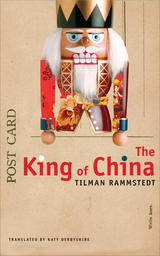
The King of China
Tilman Rammstedt
Seagull Books, 2019
When Keith Stapperpfennig and his family give their grandfather the trip of a lifetime—an all expenses paid holiday to any destination in the world—the eccentric old man arbitrarily chooses China, and he asks Keith to accompany him. But when Keith loses all the money for the journey at a casino, he goes into hiding—mostly under his desk—and his grandfather—equally uninterested in actually traveling to China—heads down the road to engage in a similar subterfuge.
And it is here that the novel opens, two men in hiding, mere miles apart. But when his grandfather dies unexpectedly, Keith is left to continue the farce alone. With the aid of a guidebook, Keith writes a series of letters home to his brothers and sisters, detailing their imaginary travels and the bizarre sights they see. These start off harmlessly, but before long he starts adding invented details: non-stop dental hygiene shows on television, dog vaccinations at the post office—and the letters get longer and longer. Engaging, strange, and ultimately moving, this hilarious novel from Tilman Rammstedt won him the prestigious Ingeborg Bachmann Prize in 2008 and confirmed him as one of Germany’s most compelling writers.
And it is here that the novel opens, two men in hiding, mere miles apart. But when his grandfather dies unexpectedly, Keith is left to continue the farce alone. With the aid of a guidebook, Keith writes a series of letters home to his brothers and sisters, detailing their imaginary travels and the bizarre sights they see. These start off harmlessly, but before long he starts adding invented details: non-stop dental hygiene shows on television, dog vaccinations at the post office—and the letters get longer and longer. Engaging, strange, and ultimately moving, this hilarious novel from Tilman Rammstedt won him the prestigious Ingeborg Bachmann Prize in 2008 and confirmed him as one of Germany’s most compelling writers.
[more]
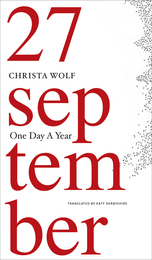
One Day a Year
2001–2011
Christa Wolf
Seagull Books, 2017
During a 1960 interview, East German writer Christa Wolf was asked a curious question: would she describe in detail what she did on September 27th? Fascinated by considering the significance of a single day over many years, Wolf began keeping a detailed diary of September 27th, a practice which she carried on for more than fifty years until her death in 2011. The first volume of these notes covered 1960 through 2000 was published to great acclaim more than a decade ago. Now translator Katy Derbyshire is bringing the September 27th collection up to date with One Day a Year—a collection of Wolf’s notes from the last decade of her life.
The book is both a personal record and a unique document of our times. With her characteristic precision and transparency, Wolf examines the interplay of the private, subjective, and major contemporary historical events. She writes about Germany after 9/11, about her work on her last great book City of Angels, and also about her exhausting confrontation with old age. One Day a Year is a compelling and personal glimpse into the life of one of the world’s greatest writers.
The book is both a personal record and a unique document of our times. With her characteristic precision and transparency, Wolf examines the interplay of the private, subjective, and major contemporary historical events. She writes about Germany after 9/11, about her work on her last great book City of Angels, and also about her exhausting confrontation with old age. One Day a Year is a compelling and personal glimpse into the life of one of the world’s greatest writers.
[more]
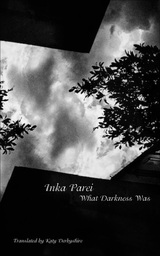
What Darkness Was
Inka Parei
Seagull Books, 2013
Close to death, an old man collapses and struggles to his bed. The sounds of the endless night unsettle him, triggering images, questions, and memories. In What Darkness Was, Inka Parei, author of The Shadow-Boxing Woman, allows the reader to inhabit a singular German mind. Precise and observant—but uncomprehending and on the brink of hysteria—the old man wracks his brain as the questions flow like water: why did he inherit the building he now lives in? Why did he leave the city that was his home for so long? Is he even here voluntarily? And who was that suspicious stranger on the stairs? Lying in bed, the old man is aware that these questions may be the last puzzles he ever solves.
Combining tight prose with a compulsive delight in detail, Parei’s second novel in English presents a dynamic portrait of the West German soul from World War II through the German Autumn of 1977.
[more]
READERS
Browse our collection.
PUBLISHERS
See BiblioVault's publisher services.
STUDENT SERVICES
Files for college accessibility offices.
UChicago Accessibility Resources
home | accessibility | search | about | contact us
BiblioVault ® 2001 - 2024
The University of Chicago Press









